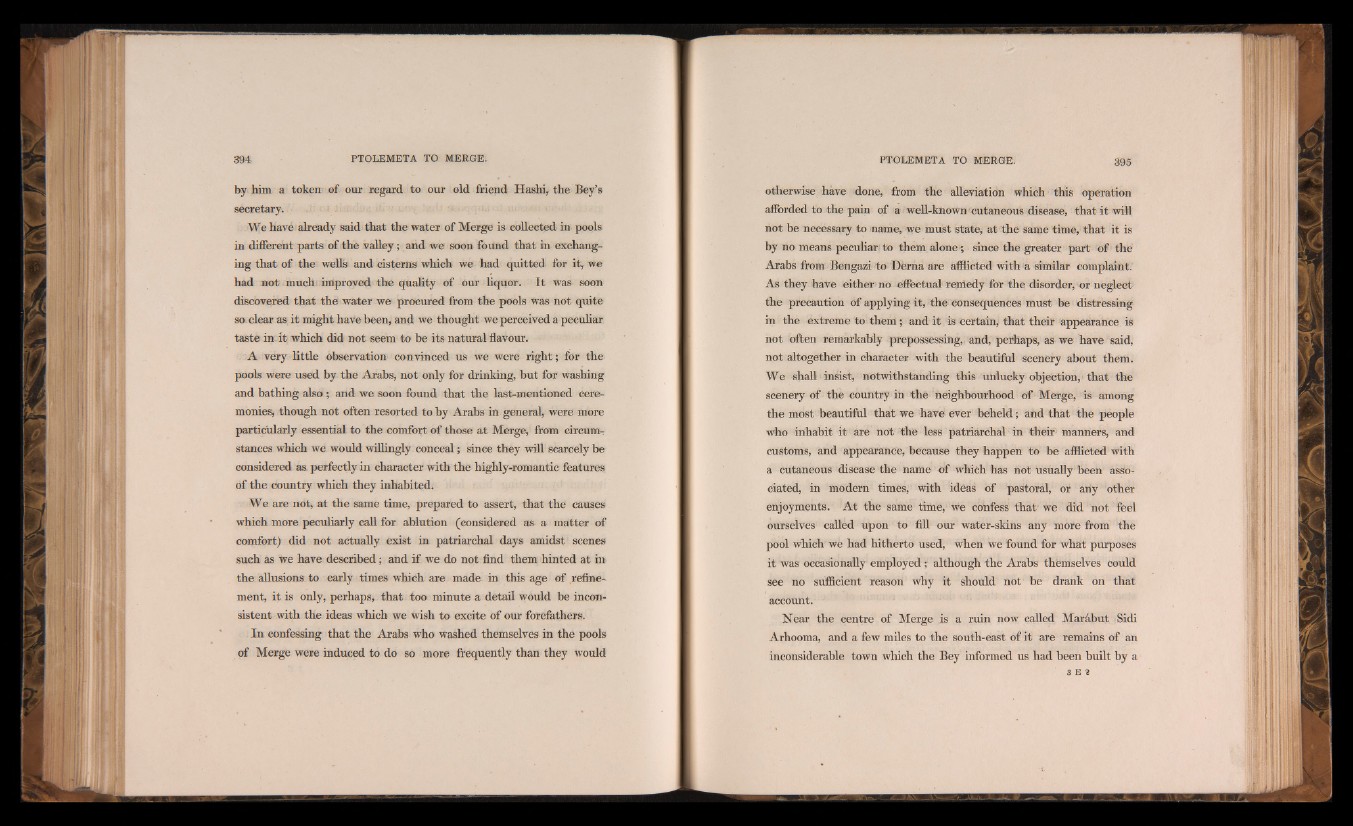
by him a token of our regard to our old friend Hashi, the Bey’s
secretary.
We have already said that the water of Merge is collected in pools
in different parts of the valley; and we soon found that in exchanging
that of the wells and cisterns which we had quitted for it, we
had not much, improved the quality of our liquor. I t was soon
discovered that the water we procured from the pools was not quite
so clear as it might have been, and we thought we perceived a peculiar
taste in it which did not seem to be its natural flavour.
A very little observation convinced us we were right; for the
pools were used by the Arabs, not only for drinking, but for washing
and bathing also; and we soon found that the last-mentioned ceremonies,
though not often resorted to by Arabs in general, were more
particularly essential to the comfort of those at Merge, from circum,
stances which we would willingly conceal; since they will scarcely be
considered as perfectly in character with the highly-romantic features
of the country which they inhabited.
We are not, at the same time, prepared to assert, that the causes
which more peculiarly call for ablution (considered as a matter of
comfort) did not actually exist in patriarchal days amidst scenes
such as we have described; and if we do not find them hinted at in
the allusions to early times which are made in this age of refinement,
it is only, perhaps, that too minute a detail would be inconsistent
with the ideas which we wish to excite of our forefathers.
In confessing that the Arabs who washed themselves in the pools
of Merge were induced to do so more frequently than they would
otherwise have done, from the alleviation which this operation
afforded to the pain of a well-known cutaneous disease, that it will
not be necessary to name, we must state, at the same time, that it is
by no means peculiar, to them alone • since the greater part of the
Arabs from Bengasi to Derna are afflicted with a similar complaint.
As they have either no effectual reniedy for the disorder, or neglect
the precaution of applying it, the consequences must be distressing
in the extreme to them; and it is certain, that their appearance is
not often remarkably prepossessing,, and, perhaps, as we have said,
not altogether in character with the beautiful scenery about them.
We shah insist, notwithstanding this unlucky objection, that the
scenery of the country in the neighbourhood of Merge, is among
the most beautiful that we have ever beheld; and that the people
who inhabit it are not the less patriarchal in their manners, and
customs, and appearance, because they happen to be afflicted with
a cutaneous disease the name of which has not usually been associated,
in modern times, with ideas of pastoral, or any other
enjoyments. At the same time, We confess that' We did not feel
ourselves called upon to fill our water-skins any more from the
pool which we had hitherto used, when we found for what purposes
it was occasionally employed ; although the Arabs themselves could
see no sufficient reason why it should not be drank on that
account.
Near the centre of Merge is a ruin now called Mar&but Sidi
Arhooma, and a few miles to the south-east of it are remains of an
inconsiderable town which the Bey informed us had been built by a
3 E 2